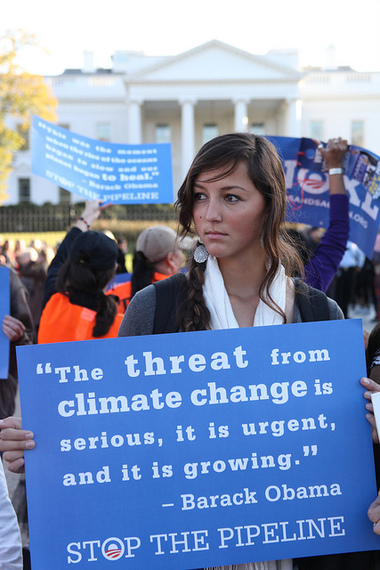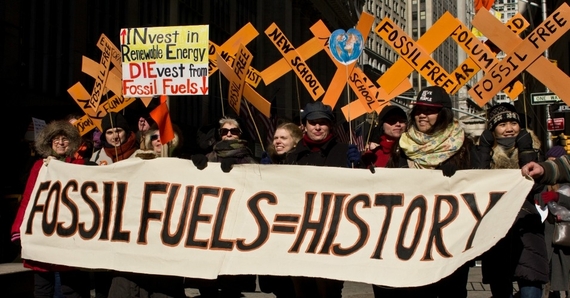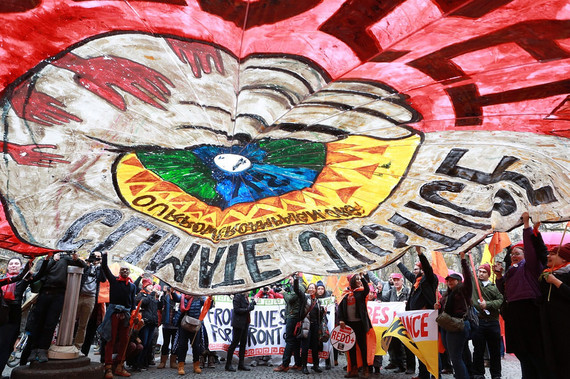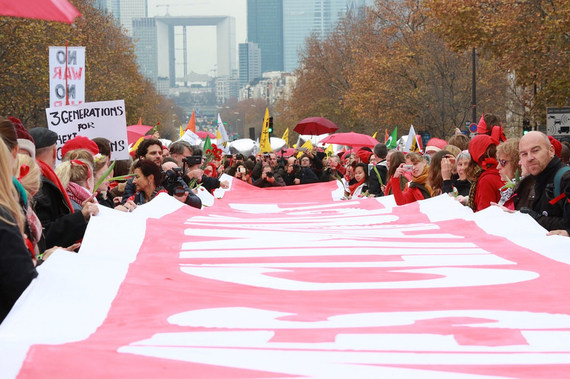Four years ago last August, a group of us sat down in front of the White House holding placards with climate promises that President Obama had made during his campaign and waited to get arrested. We were there to protest the Keystone XL pipeline, which our nation's top climate scientist had said would be a fuse to the largest carbon bomb on the planet, but which the President was by all accounts looking to approve.
Those sit-ins helped launch a national campaign against the Keystone XL pipeline that ultimately forced the President to reverse course and reject the project this fall. It was the first time that a head of state rejected a major fossil fuel project because of its impact on the climate--but it won't be the last.
We tried many different strategies over those four long years of fighting the pipeline, but one of the most effective remained our ability to draw the contrast between the promises President Obama made and the actions he intended to take. Trying to hold politicians to their word isn't a unique political tactic, but climate activists have a few advantages. While some promises, like "I will support equality" are vague and open to interpretation, climate promises are often routed in science. With Keystone XL we could do the math. You say you won't approve a project that has a negative impact on the climate? Well, here's the concrete evidence that the emissions from this pipeline will be equivalent to 46 coal fired power plants. How 'bout them apples?
Exposing the gap between rhetoric and reality has been a critical strategy for the growing fossil fuel divestment movement, as well. At the heart of the campaign has been some more simple math: governments say they want to keep global warming below 2°C to avoid catastrophe; that will require limiting the amount of carbon that goes into the atmosphere below 595 gigatons; the fossil fuel industry has over 2,795 gigatons in their reserves; that's five times too much; therefore their business plan is incompatible with a livable planet.
The fossil fuel industry has tried to critique the divestment campaign from a thousand different angles, but they've never been able to argue with it's basic logic, which is why every week more and more divestment wins keep coming in. As the reality of the situation begins to sink in, institutions that care about addressing the climate crisis realize that to maintain their investments would amount to hypocrisy. Those with moral character, divest. Those who lack it, come under immense pressure to do so.
The agreement that is emerging from here at the climate talks is far weaker than many of us would like. So weak in some places that it amounts to an utter disaster. The rights of indigenous peoples have been relegated to a line in the preamble. The United States and others have succeeded in refusing to link any compensation to the loss and damages that vulnerable countries will experience because of the emissions we pumped into the atmosphere over the last hundred years. The greenhouse gas reduction pledges on the table will still push global warming over 3°C--which, in the elegant phrasing of Bill McKibben is the equivalent of "hell."
But there are some things to point to. Thanks to a massive push from the world's most vulnerable countries, supported by activists around the world, contained in the text are commitments to now try and limit global warming to below 1.5°C. Countries like Canada, Brazil, and the United States have all recognized the target. The text also has a recognition of the carbon budget, and the need to scale up pre-2030 emissions pledges to keep more greenhouse gases out of the atmosphere. There's good language about reviewing country pledges and scaling up ambition every five years.
None of it is radical, none of it is enough. It's unacceptable that the fossil fuel industry has forced us to wait this long for a global agreement on climate change, especially now that we know companies like Exxon knew their product was fueling climate change 25 years ago. But I still think the Paris agreement gives us a new tool to fight with.
Canada wants to expand tar sands development? How exactly are you going to justify that with your recent commitment to keep global warming below 1.5°C? Banks want to finance more coal fired power plants? Didn't you just see every country on earth commit to a plan that will require the end of fossil fuels? You're pursuing a business plan that is counting on your ability to keep emitting enough carbon to push the world to over 7°C of warming--how exactly do you plan on explaining that to your investors, let alone government regulators?
There are many ways to look at the climate deal coming out of Paris. We can identify with both those who criticize its lack of ambition, and those who are desperate to celebrate its success. Because the real outcome of the agreement isn't contained in the text, but what comes after. As always, the amount of change we see will be determined by the amount of courage we have to fight for it. At 350.org, we're already working with allies around the world to organize a series of massive mobilizations against the fossil fuel industry this spring, and will be doubling down on the divestment campaign starting, well, today. We'll be doing so with a lot of new promises to put on our placards, and a lot of politicians to hold accountable.
Time to get back to work.
This post is part of a series produced by The Huffington Post, in conjunction with the U.N.'s 21st Conference of the Parties (COP21) in Paris (Nov. 30-Dec. 11), aka the climate-change conference. The series will put a spotlight on climate-change issues and the conference itself. To view the entire series, visit here.




